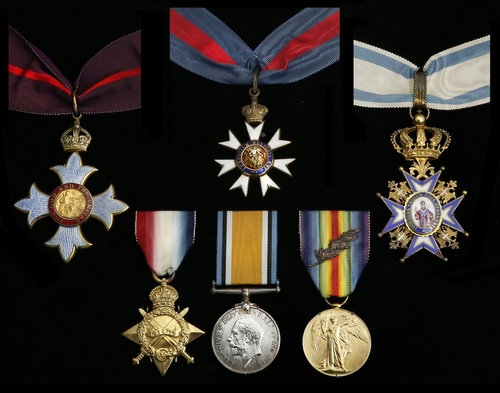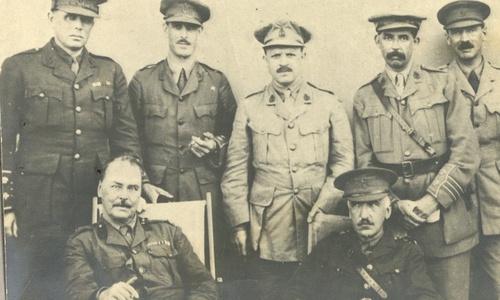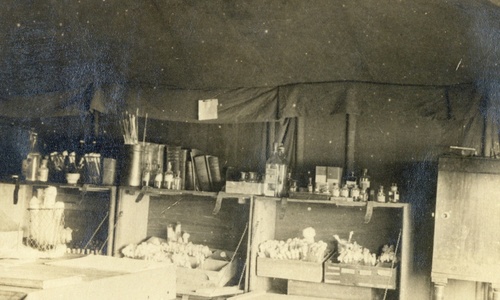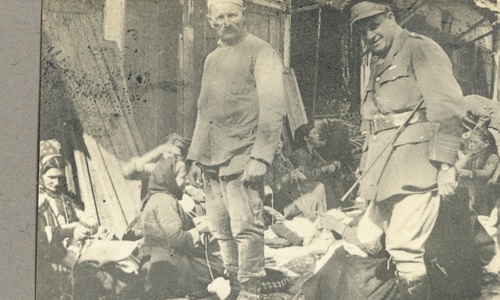Auction: 18003 - Orders, Decorations and Medals
Lot: 575
Sold by Order of a Direct Descendant
An outstanding Great War C.M.G., C.B.E. group of six awarded to Lieutenant-Colonel L. S. Dudgeon, Royal Army Medical Corps, one of the foremost medical specialists of his generation and the 'leading spirit' in bacterial research at St. Thomas's Hospital, not least in respect of the nature of germs commonly found in infected wounds: hence his special deployment to Gallipoli and Salonica
A regular contributor to The Lancet, the Professor delivered the Erasmus Wilson lectures at the Royal College of Surgeons and the Croonian and Horace Dobell lectures at the Royal College of Physicians, his work inspiring more than one department of morbid history
The Most Distinguished Order of St. Michael and St. George (C.M.G.), Companion's neck badge, silver-gilt and enamel; The Most Excellent Order of the British Empire (C.B.E.), Military Division, Commander's 1st type neck badge, silver-gilt and enamel; 1914-15 Star (Lt. Col. L. S. Dudgeon, R.A.M.C.); British War and Victory Medals, M.I.D. oak leaf (Col. L. S. Dudgeon); Serbia, Order of St. Sava, Commander's neck badge, in silver, silver-gilt and enamel, minor enamel damage to the last, generally very fine or better (6)
C.M.G. London Gazette 1 January 1918.
C.B.E. London Gazette 3 June 1919.
Leonard Stanley Dudgeon qualified in medicine in 1899, as a St. Thomas's Hospital student, and quickly evinced special aptitude for scientific work; as a Louis Jenner student in pathology he became a prominent figure among the junior investigators at the institution.
The Great War - Gallipoli and Salonica
In July 1915, as a Lieutenant-Colonel in the Royal Army Medical Corps, Dudgeon was appointed a member of a committee proceeding to the Mediterranean to advise on matters connected with the prevention of epidemic disease. At the time, articles were appearing in newspapers headlined 'Fighting the Soldiers' Worse Foe'; many were receiving inoculations against enteric in a bid to reduce epidemic outbreaks. Dudgeon set sail for Egypt aboard the P. & O. steamer Maloja, together with other esteemed medical specialists, notably Lieutenant-Colonel Sir Ronald Ross, K.C.B., Consulting Physician on Tropical Diseases, and Lieutenant-Colonel Willcox, an expert on gas poisoning and water contamination.
On arriving at Alexandria, first impressions were not favourable, Dudgeon observing: 'The Sea was nice at a distance, but at close quarters the odour was very unpleasant and only most filthy looking material was thrown over the sea wall. Heat was intense. Shops were only fair. In the late afternoon, dust was considerable. Was informed when I arrived (at Alexandria) that General Babtie, V.C., was ill with dysentery … '
However, as time passed, he began to appreciate the ingenuity of the R.A.M.C., noting; 'fishing net (used) for keeping flies from entering a building. Col. Robinson, R.A.M.C., spoke highly of this.' On 31 July 1915, Dudgeon joined a conference with Generals Maxwell and Ford, the Mayor of Alexandria, and Dr. Glanville, which considered the condition of the camps in Alexandria - 'Bacteriology not well managed.' Things got worse at Ismalia, whereupon the Hotel des Boy Voyageurs was 'Vy. dirty' and 'The bathroom was the foulest I had ever seen.'
On 15 August 1915, Dudgeon departed Alexandria for Mudros aboard the P. & O. Hospital Ship Devanha. Three days later he noted: 'At 8.45 p.m. we had a special service for those who lost their lives on board H.M. Transport "Royal Edward". We were the first boat to pass directly over the spot since the disaster. We saw large quantities of wreckage. Life boat (upside down) and belts.' At 9.30 a.m. on 19 August, Dudgeon began a long morning inspection of the Australian Camp Hospital and what he saw seemed to concern him greatly:
'This hospital had some serious defects, more especially the fact that if a surgical case developed dysentery, he was not removed from the surgical ward. Typhoid cases were diagnosed by clinical methods or by taking the faeces for about a distance of ½ - ¾ of a mile for bacteriological methods!! … they had been badly dealt with, losing many officers killed and wounded.'
On 29 August, he boarded the S.S. Ermine and the next day no less than three shells exploded within 15 yards of the ship as it headed to Helles. He was however full of praise for the 11th Casualty Clearing Hospital under Colonel Humphrey, for it was an 'Excellently arranged place.'
Dudgeon's subsequent time on the Gallipoli peninsula was to result in health problems of his own. On 3 September 1915, he wrote: 'DID NOT FEEL WELL. Did not feel at all well this morning. Headache & Temp. of 100 degrees.' By the following Sunday, things had not improved: 'Tonight my Temp. was 101 degrees & headache extreme, so much that I had to get up at 12 and sit outside my dug out. Aspirin never had any effect and quinine only temporary. My belief is that I received some food infection at Gully Beach.'
He recovered after approximately three weeks and recommenced his efforts visiting field hospitals and casualty clearing stations, noting regular bouts of jaundice and continual harassment from Turkish artillery.
On his return to London, Dudgeon's newly acquired knowledge was much in demand and he was subsequently appointed Consulting Bacteriologist to the British Salonica Force. He was embarked in the S.S. Glengorm Castle. As at Cape Helles, Dudgeon found dysentery to be particularly damaging to the health of the men, but he also struggled with cases associated with the wet and cold. He was awarded the C.B.E. Other than returning to London to be invested with his earlier award of the C.M.G. at Buckingham Palace, he remained actively employed in Salonica until the war's end. He was additionally thrice mentioned in despatches (see below) and appointed to the 3rd Class of the Serbian Order of St. Sava (London Gazette 10 September 1918, refers).
Postscript
In the years following the Great War, Dudgeon continued his medical studies, but also began to spend time on less academic affairs. As Dean of St. Thomas's Hospital, he became a regular prize-giver, and as a member of the Beaconsfield Artisan Golfing Society, he appeared to enjoy speaking at dinners and offering anecdotes of his past. In 1928 he published an important work, Bacterial Vaccines and their Position in Therapeutics. This met with positive reviews from The Anti-Vivisection Journal.
In his final years at Thomas's, Dudgeon placed great emphasis upon encouraging a new generation and bolstering the Scholarship programme. The Professor died in October 1938.
Sold with a quantity of original documentation, including:
(i)
War Office letter, dated 14 July 1915, informing the recipient of his appointment as a Member of a Committee proceeding to the Mediterranean, to advise the Mediterranean Expeditionary Force on matters connected with the prevention of epidemic disease; and related travel arrangements letter from the War Office.
(ii)
His M.I.D. certificates (3), dated 25 October 1917, 1 November 1918 and 9 March 1919; together with Post Office telegram regarding his Buckingham Palace C.M.G. investiture.
(iii)
A photograph album, commencing with approximately a dozen images of family life in Blythburgh and Aldeburgh in the mid 1920's, together with five images of military life during the Great War.
(iv)
R.A.M.C. dinner invitation to the Connaught Rooms, in appreciation of the splendid services of the R.A.M.C. and the eminent civilians attached to it during the war; further dinner invitations, including invites from the Worshipful Company of Armourers and Brasiers, and St. Thomas's House Old Students; Annual Dinner menus from the Beaconsfield Artisan Golfing Society.
(v)
Prize-Giving award booklets relating to the distribution of prizes to students at St. Thomas's Hospital; photographs of the recipient, including a group shot with H.R.H. The Duke of Connaught at the St. Thomas's Prize Giving on 28 June 1932.
(vi)
Ordinary writ document - Unliquidated Demand, In the High Court of Justice between H.R.H. the Princess Von Dembinska, and H.R.H. the Prince Von Dembinska, calling Dudgeon to appear at the High Court, 1931.
(vii)
A modern file titled 'Army Book 152. Correspondence Book. (Field Service.) Leonard Stanley Dudgeon, C.M.G., C.B.E., F.R.C.P.', which includes in modern mss. form, the 'Diary of Experiences as a Member of the Commission on Prevention of Infectious Diseases to the Mediterranean Expeditionary Force, 15.7.1915 - 19.11.1915', 30 pp.; together with the 'Diary of My Experiences as a Member of the War Office Commission on Epidemic Diseases for the M.E.F.', 1915, 8 pp. and others for the 'Balkans 1916-1917.'16 pp., and the 'Balkans 1917-1918,' opened on 27.8.1917, 16 pp.
Subject to 20% VAT on Buyer’s Premium. For more information please view Terms and Conditions for Buyers.
Estimate
£2,800 to £3,200











